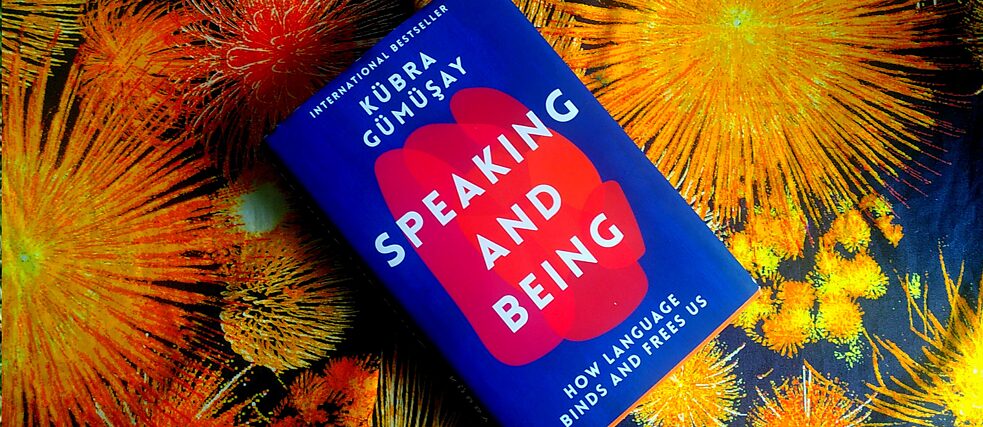June 2022
Kübra Gümüşay: Speaking and Being

Kübra Gümüşay’s Speaking and Being offers a thought-provoking companion piece to Emma Dabiri’s What White People Can Do Next.
Books do not necessarily make us better people. As writer and activist Jessica Gaitán Johannesson has written more eloquently than I can, fetishizing reading or writing alone as activism runs the risk of becoming an excuse to not actually put in the work needed for change.
And yet, and yet. There are books out there which put words to the injustices we’ve perceived but couldn’t express, which give us the space to imagine better worlds and suggest tools to start making these a reality. For me, one of those books is Emma Dabiri’s What White People Can Do Next. An impassioned yet nuanced writer, Dabiri recognises the traditions she is working in, and the book offers a fantastic introduction to the writings of the likes of Angela Davis and James Baldwin. Drawing on the conviction that no one is free until everyone is, Dabiri makes a plea for a solidarity based on coalitions across groups with different convictions and aims.
Kübra Gümüşay’s Speaking and Being: How Language Binds and Frees Us (tr. Gesche Ipsen) offers a thought-provoking companion piece to What White People Can Do Next. Although perhaps an easier read than Dabiri’s densely packed text, Speaking and Being is similarly well researched, grounded in and citing the conversations and contexts it emerges out of.
Starting by considering how language shapes our perception of the world (although hardly a new topic, it’s refreshing to read it from the perspective of a fellow polyglot), Gümüşay examines our society as one made up of the “labelled” and the “unlabelled”: “The unlabelled are people whose existence isn’t in question. They are the standard. The norm… They are at the same time the labellers.” Those who differ from the norm are the labelled – people of colour, for instance, or members of the queer community – and Gümüşay documents how the labelled are repeatedly denied individuality, expected by the mainstream to act as representatives for their respective communities. She talks movingly of how her own and her friends’ reduction to the identity of hijab-wearers – in the media, at work, on the street – inhibited their perception of themselves, and of the exhaustion caused by the constant need to explain her identity and choices.
Building on this, Gümüşay turns her gaze to the rise of the far right in western societies. “If you want to know the challenges that await us all,” she tells the reader, “you should listen closely to those who are already suffering under the current social structures”. Examining how right-wing thinkers increasingly determine the topics of public discourse, she makes a plea for us to stop reacting to the provocations of the far right. “Our outrage is their currency”, she warns: “We have to stop responding, and instead prioritise those issues and questions that can move society forward.” It is a timely and important reminder.
Speaking and Being is full of questions (What does it mean? What to do? What would happen if?), and Gümüşay freely admits that she doesn’t have any conclusive answers. What she proposes though is a new way of speaking and listening, one which allows for criticism, fallibility and change: “doubtful, thoughtful, questioning, sometimes loudly, sometimes quietly – and always with kindness.”
About the author
Annie Rutherford makes things with words and champions translated literature in all its guises. A writer, translator and events organiser, she's currently researching the possibility of setting up a Writers in Exile residency in Edinburgh, and also runs Lighthouse Bookshop's Women in Translation book group. She can spot a misplaced apostrophe at a distance of fifty yards.Glasgow library: Reserve the original German title.
London library: Reserve the English translation of the book.
E-Library: Borrow the original German title.
Find out more about the blog.
Book Blog Overview